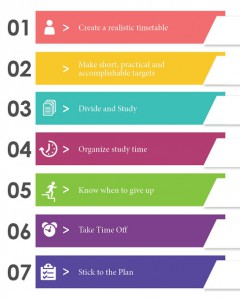A lot is said about time management and there are several techniques on how you can improve your time management skills. Any UPSC IAS aspirant will know the value of time since it can feel like there is so much to study and not enough time for everything for the IAS exam.
Don’t be fooled by the Calendar. There are only as many days in the year as you make use of. One man gets only a week’s value out of a year while another man gets a full year’s value out of a week.
-Charles Richards

Making a Timetable for UPSC Prep

- The sheer quantity of learning you have to do in order to cover the UPSC syllabus mandates that you prepare a study timetable and follow it without fail.
- Click here to know how to make a timetable for UPSC preparation so that you can fix your daily routine for Civil Service Exam preparation.
What is Productivity?
Productivity is basically the efficiency with which you use your time. Your productivity increases if you can do more result-producing work in less time. This article talks about the link between both and the importance of time management for productivity.
At the outset, check out some basic facts.
There are 24 hours in a day which translates to 86,400 seconds in a day.
These seconds once gone are not coming back. We cannot store it aside for later use. So, as you can see, time has to be spent more wisely than money for the simple reason that money can be earned later, time once gone is just gone!
Also read, 7 Productivity Tips to Clear UPSC Civil Services Exam
Another important thing to remember is the BODY CLOCK. We all have a body clock and we must listen to it.
- When are we the most productive?
- When are we the most tired or sleepy?
- If we adjust our time schedule according to our body clock, we can definitely get more productivity out of ourselves.
For example, if you are the most energetic during the dusk hours, do make it a point to study your most difficult subject at that time because you will be most alert and focused then.
Candidates preparing for UPSC exam can check out the following links to give and edge to their preparation-
How to make use of the given time?
Personal discipline. These two words are powerful weapons that all successful people swear by. Whether it is sports, academics, management, business, or arts, personal discipline is the key to success. It is what we sow that we reap.
- If we want to trust, we must sow honesty. Similarly, if we desire success, we must sow hard as well as smart work. Being able to work hard comes through personal discipline.
- Smart work comes from choices like reading Comprehensive News Analysis instead of spending excessive time understanding multiple sources of the daily news.
- It involves many aspects like leading a healthy lifestyle, waking up on time, sleeping on time, eating on time the right kind of food, taking breaks whenever necessary, and focusing by keeping away all temptations and distractions.
- If we imbibe personal discipline, more can be done in less time.
It’s always good to give UPSC test series to boost the confidence. It helps you realise how you work under pressure.
Another important thing to remember is that time management and the value for time is learnt during childhood. But this has to be revised every day if we aren’t to forget these valuable lessons.
- Cracking the UPSC civil services exam is no mean feat and it takes people of a special calibre to do so. This calibre can be acquired through deep understanding and constant revision. Current affairs revision can be efficient by referring to concise materials like BYJU’s IAS Monthly Magazine that can save time and effort.
- Everybody is born with the same energy, but our surroundings and outlook changes this energy as we grow up.
- But with determination and single-minded devotion to a goal, personal discipline can be inculcated.
- With this, hard work won’t seem so hard anymore and before you know it, success would come knocking at your door.
Related Links:
| How to prepare for UPSC Current Affairs? | UPSC Prelims Syllabus |
| Question Types in UPSC Civil Services (IAS) Mains Exam | UPSC Mains Syllabus |
| IAS 2021 | Get Inspired! |

Comments